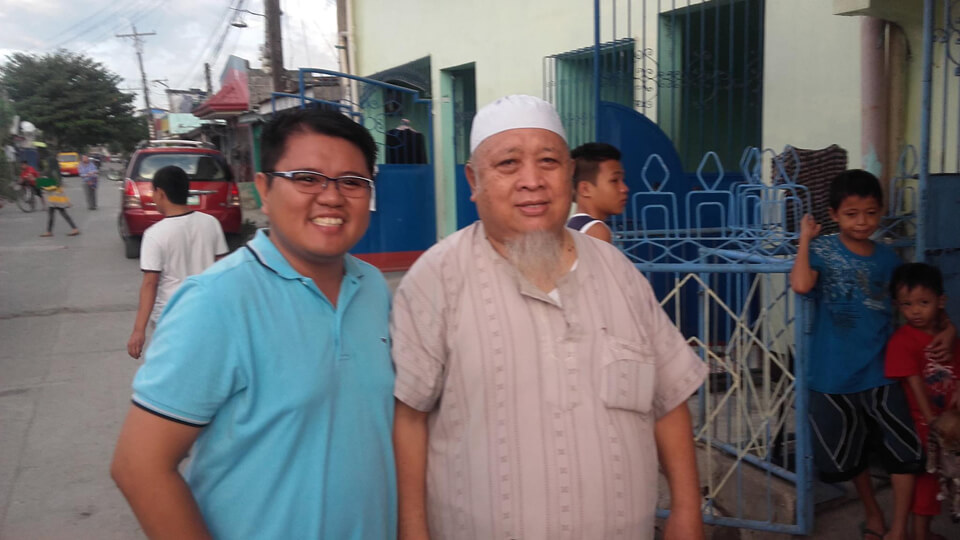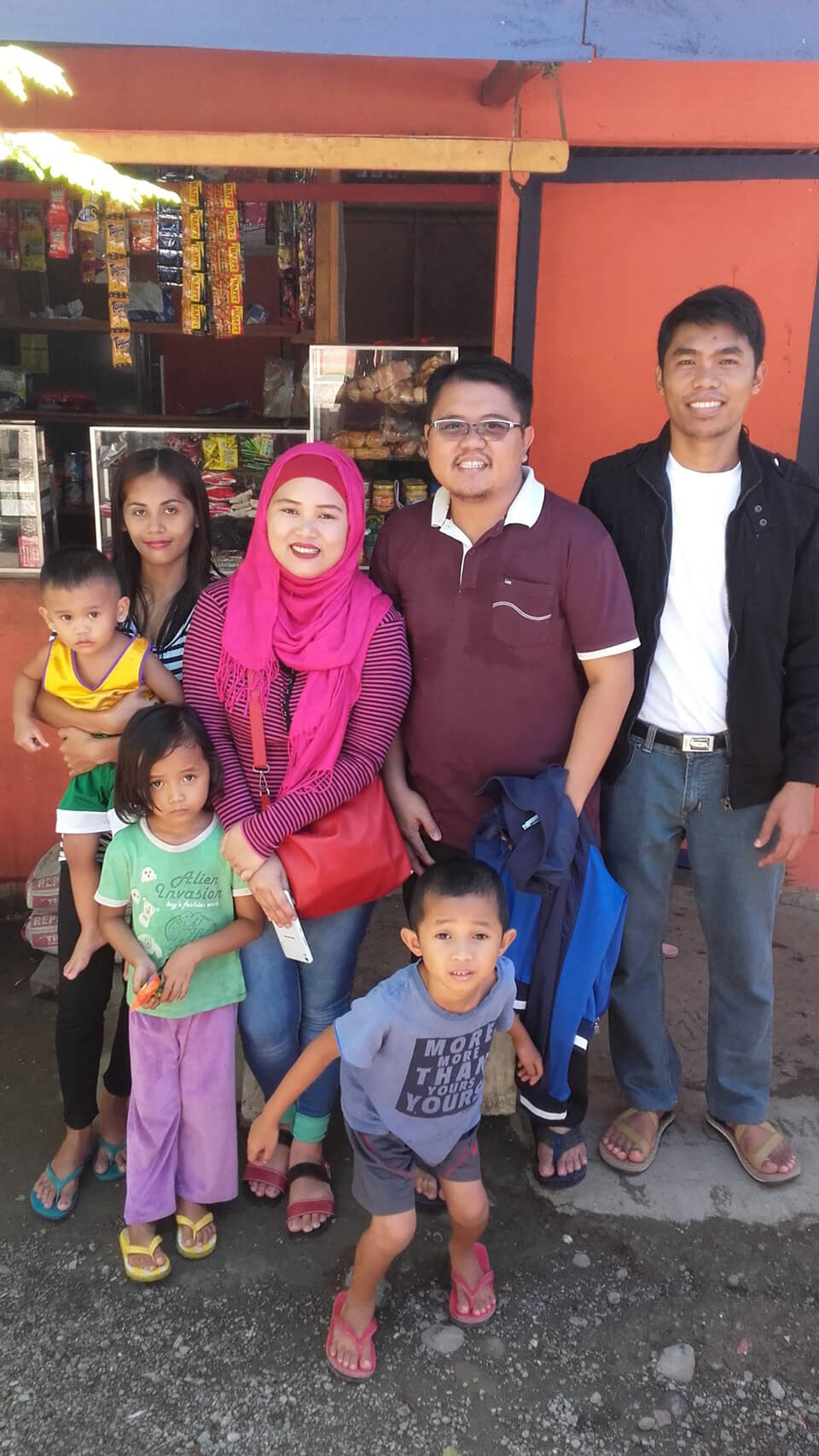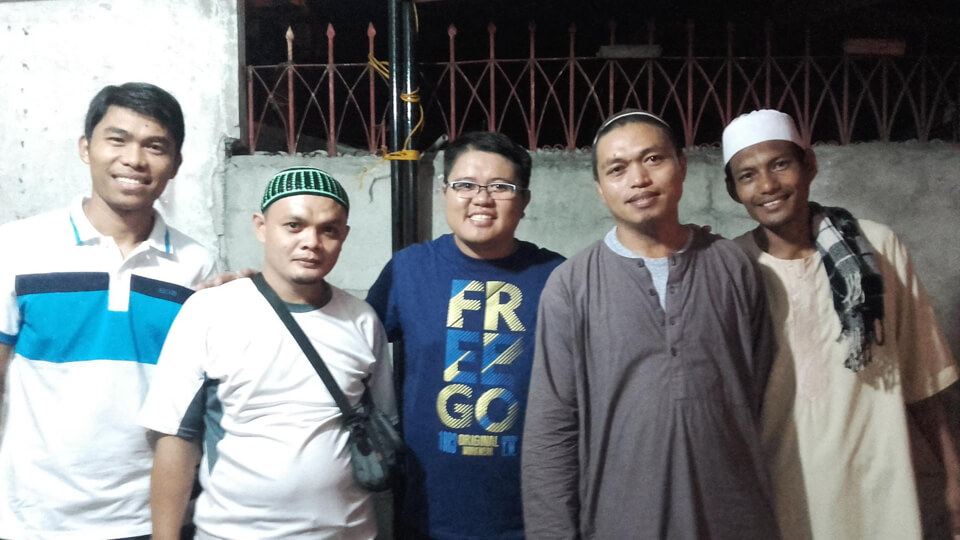Dialogue of Life in Lanao del Norte
Elbert Balbastro and Jerry Lohera are two Columban seminarians, Elbert from Oton, Iloilo, Panay, and Jerry from La Victoria, Kauswagan, Magsaysay, Misamis Oriental. Later this year they will be going to Pakistan for their two-year First Mission Assignment. Both entered the Columban seminary formation in June 2012. Both are now in their second year of Theology in Pastoral Ministry at Loyola School of Theology, Ateneo de Manila University, Quezon City.
In June 2016 they spent two weeks with the Maruhom Family, who are Muslims, in Sigayan, Sultan Naga Dimaporo, Lanao del Norte. Here they share their experience.
Dialogue of Life – Experiencing What Enhances One’s Understanding
By Elbert Balbastro

Elbert Balbastro with the Imam in the Mosque in Vamenta Subdivision, Barra, Opol, Misamis Oriental
‘Unity in the midst of diversity’ is a commonly used expression in regard to engagement in dialogue. Living for two weeks in Sigayan, Sultan Naga Dimaporo, formerly Karomatan, Lanao del Norte, in Mindanao, Philippines, with my fellow Columban seminarian Jerry Lohera, I encountered two distinct ethno-religious groups living in the same house. The first was the Meranao tribe, to which our host family, that of Ali Maruhom, belonged and the other was the Talaandigto which the woman of the house, Daya Maruhom, and her cousins who happened to be spending their vacation in the house when we arrived belonged. The Talaandig people live mostly in the Province of Bukidnon.
We usually had our meals together and shared stories such us our life experiences, the people we had met and our journeys in life. One time during supper we talked about our different cultures, religions and languages. There are many languages in the Philippines, belonging to different regions and to different tribes. For instance, my language is Hiligaynon (Ilonggo), Jerry speaks Bisaya (Cebuano). The Meranao speak their own Meranao language and the Talaandig have their own distinct language also. Our common language was Bisaya. However, despite our different languages, one thing that stood out in all our conversations is that we all believe in one God who created the Earth and we all agreed that we have the responsibility to preserve and take care of it. Though there are differences in how we name and how we profess and worship the God we know, we all believe that it is due and proper to give thanks to this Mighty One. We discussed the different names of God according to our own language – Allah, Ginoo, Magbabaya, Dios – but we agreed that this God alone is the Creator of the universe. Through these discussions we developed a good friendship and we have good memories that we will treasure.
Looking back on all of this I realize that in dealing with religions or beliefs other than my own, it is better to talk about the commonalities rather than the differences. We all recognize that there are many differences in our traditions, beliefs and understanding of things. What is important for us is to recognize the oneness and commonalities among us – Ilonggo, Bisaya, MeranaoandTalaandig– foremost among these which is that we believe in a God who created the world. Furthermore, it is also good to look at and learn from each other’s cultures and traditions because we are all Filipinos.
Coming from the island of Panay where the majority are Christians, it was quite difficult at the beginning to cope with living in Sultan Naga Dimaporo, where the majority of the people are Meranao Muslims. Amidst my apprehensions and fears – which come from exaggerated media coverage about Mindanao and the Muslims – I learned that not all we hear is correct. We need to discover the truth by living and experiencing the Muslim way of life.
I am blessed to have had this immersion experience. It has refined my understanding and has helped me to process my negative emotions and perspectives towards Muslims. Through it I have come to know about the culture and beliefs, not only of the Meranao Muslims but also of the Talaandig tribe. It was the first time that I had heard about this tribe.
Experience is indeed the best teacher. It has not only taught me to deal with my fellow beings but has also enhanced my understanding of and attitudes towards other people regardless of race, religion, beliefs, skin-color or nationality. Dialogue of Life is about letting ourselves be immersed in cultures other than our own rather than just listening to the media and reading books, newspapers and social networking sites that, inevitably, give us a very incomplete picture of the world around us.

Allahu Akbar!
By Jerry Lohera

Elbert Balbastro (2nd from right) and Jerry Lohera (far right) with members of the Maruhom family.
Being with the Maruhom family in Sigayan, Sultan Naga Dimaporo, Lanao del Sur, was a memorable experience because of the observance of Ramadhan. To interiorize our solidarity as Christians with Muslims in the holy season of Ramadhan, Elbert Balbastro and I joined them in their fasting. We woke up around 3:00am to prepare our early meal. We were allowed to eat and drink water until 4:15 am and when the call to prayer was heard from the masjid, Allahu Akbar the fasting began for the day. We then returned to bed or waited for the sunrise. During the holy month of Ramadhan, every Muslim of good health and right age is required to fast for 30 days. Being my first time to do their way of fasting brought me so in touch with the basic reality of my need to eat and to drink but at the same time it also brought me into a spirituality of deep surrender to God. Allahu Akbar literally means God is Greater! The loudspeakers from the mosque have the humble task of reminding the faithful that, more than anything else, God is Greater than any physical or physiological needs or than any human designs. As a Christian, Allahu Akbar allows me to encounter my personal God who is first and foremost my refuge and my strength. In this way, it gives new meaning, enabling me to get to know my personal God as Greater than my own personal will. My experience of fasting during Ramadhan allowed me to a have full trust in God’s caring hand.
On the first day of fasting Elbert and I went to Malabang and Balabagan on a motorcycle under the heat of the sun. We refused invitations for snacks and a meal from Fr Rogelio D. del Rosario MJ, parish priest of Malabang, and Bishop Edwin A. de la Peña MSP because we didn’t want to break our fast. By the time we got home Maruhom family were convinced that we had broken our fast. That’s why they seemed surprised to discover that that we hadn’t.
A terrible thirst and hunger would strike me between 3:00 and 5:00 in the afternoon, but I had to wait until 6:05 to break the fast, something I did patiently. The countdown began on the local radio station until the call to prayer in the mosque was heard and then the fasting for the day came to an end. To break the fast, a Muslim usually drinks water first and then eats some fruits like banana or water melon, followed by the evening meal. In my seven days of fasting, with my host Maranao family, there was always a feeling of fulfillment every time I heard Állahu Akbar from the mosque. Along with this was the feeling of being grateful to God who designs everything for the good of humanity and who showers us with blessings and graces before we even attempt to ask for them.
Although I wasn’t able to finish the thirty-day fasting during the holy month of Ramadhan, the seven days when I did fast was a wonderful and fulfilling experience. Ramadhan is a special treasure among Islamic religious practices. It is deeply rooted in faith and trust in Allah (God) who delights in the sincerity of heart of the faithful. It is in God alone that my soul is at rest. God is my everything! In Allah (God) there is nothing I shall want. Truly, the greatness of God is beyond all else. Allahu Akbar!

Jerry (far left), Elbert (center) and Muslim neighbors
